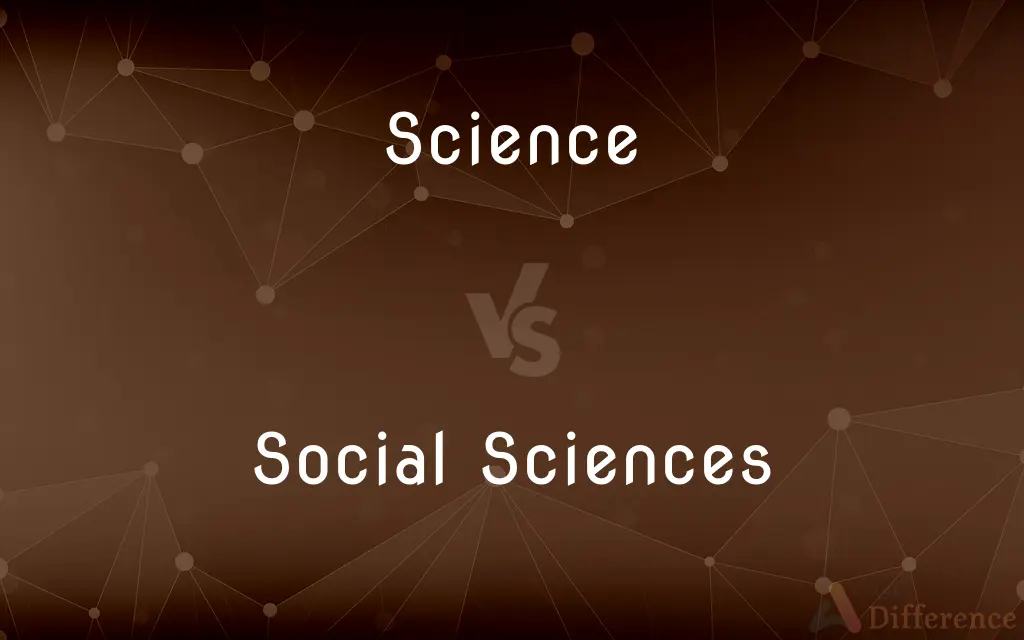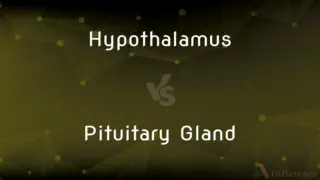Science vs. Social Sciences — What's the Difference?
By Tayyaba Rehman — Published on November 8, 2023
Science primarily involves understanding the natural and physical world through observations and experiments. Social Sciences explore human society and social relationships, employing various methodologies to understand social phenomena.

Difference Between Science and Social Sciences
Table of Contents
ADVERTISEMENT
Key Differences
Science primarily pertains to the systematic enterprise that builds and organizes knowledge in the form of testable explanations and predictions about the universe. Through the application of the scientific method, it seeks to uncover the underlying principles governing the physical and natural world. Science relies heavily on empirical evidence and is often associated with the study of topics such as physics, chemistry, and biology.
Conversely, Social Sciences delve into the study of human societies and the relationships among individuals within those societies. It encompasses diverse fields like sociology, psychology, and economics, which utilize various methodologies, often including hypothesis testing, but also employing other qualitative methods to gain insights into human behavior and societies. Social Sciences scrutinize human interactions, cultural phenomena, and societal development across various contexts and times.
The breadth of Science is wide and encompasses various fields that delve into the exploration of the physical, chemical, biological, and environmental aspects of the world. It seeks to decipher the laws, behaviors, and structures of the physical and natural phenomena by adopting a systematic methodology, often entailing controlled experiments and robust data analysis.
In contrast, Social Sciences navigate through the complexity of societal structures, human behaviors, and cultural phenomena. By adopting a myriad of methodologies, Social Sciences explore the intricate web of social relationships and the various factors that influence them, providing insights that can aid in understanding and potentially addressing societal issues.
Although both Science and Social Sciences aim to understand and elucidate the world we live in, they diverge significantly in their focus and methodologies. While Science often adheres strictly to the scientific method involving hypothesis testing via controlled experiments, Social Sciences might employ a wider array of methodologies, acknowledging the complex and multifaceted nature of human societies and behaviors.
ADVERTISEMENT
Comparison Chart
Focus
Physical and natural world
Human society and relationships
Methodology
Primarily experimental
Diverse, includes qualitative
Subject Matter
Physics, chemistry, biology
Sociology, psychology, economics
Object of Study
Natural phenomena and entities
Human behaviors and societies
Application of Findings
Technology, medicine, etc.
Policy-making, social welfare, etc
Compare with Definitions
Science
Science is the systematic study of the physical and natural world.
The advancements in technology are often attributed to the progress in Science.
Social Sciences
Social Sciences explore the varied aspects of human social behavior.
Psychology, a field in Social Sciences, explores the intricacies of human mind and behavior.
Science
Science involves organizing knowledge in the form of testable hypotheses.
Science often requires rigorous testing to validate theories.
Social Sciences
Social Sciences explore the facets of human society and interactions.
Social Sciences help us comprehend the dynamics of our societies.
Science
Science explores the mechanisms and laws of the natural world.
Science has enabled us to understand the foundational principles of our world.
Social Sciences
Social Sciences scrutinize human behavior and social structures.
Through Social Sciences, we understand the reasons behind societal norms.
Science
Science employs empirical methods to validate theories.
The scientific method is pivotal in conducting Science effectively.
Social Sciences
Social Sciences analyze and interpret human interactions and societal functions.
Social Sciences offer insights into how societies develop and function.
Science
The observation, identification, description, experimental investigation, and theoretical explanation of phenomena
New advances in science and technology.
Social Sciences
Social Sciences involve the study of societal and cultural phenomena.
Anthropology, a branch of Social Sciences, explores various cultures.
Science
Such activities restricted to a class of natural phenomena
The science of astronomy.
Science
A systematic method or body of knowledge in a given area
The science of marketing.
Science
(Archaic) Knowledge, especially that gained through experience.
Science
(countable) A particular discipline or branch of learning, especially one dealing with measurable or systematic principles rather than intuition or natural ability.
Of course in my opinion Social Studies is more of a science than an art.
Science
Specifically the natural sciences.
My favorite subjects at school are science, mathematics, and history.
Science
Knowledge gained through study or practice; mastery of a particular discipline or area.
Science
The fact of knowing something; knowledge or understanding of a truth.
Science
(uncountable) The collective discipline of study or learning acquired through the scientific method; the sum of knowledge gained from such methods and discipline.
Science
(uncountable) Knowledge derived from scientific disciplines, scientific method, or any systematic effort.
Science
The scientific community.
Science
Synonym of sweet science
Science
Obsolete spelling of scion
Science
To cause to become versed in science; to make skilled; to instruct.
Science
To use science to solve a problem.
Science
Knowledge; knowledge of principles and causes; ascertained truth of facts.
If we conceive God's sight or science, before the creation, to be extended to all and every part of the world, seeing everything as it is, . . . his science or sight from all eternity lays no necessity on anything to come to pass.
Shakespeare's deep and accurate science in mental philosophy.
Science
Accumulated and established knowledge, which has been systematized and formulated with reference to the discovery of general truths or the operation of general laws; knowledge classified and made available in work, life, or the search for truth; comprehensive, profound, or philosophical knowledge.
All this new science that men lere [teach].
Science is . . . a complement of cognitions, having, in point of form, the character of logical perfection, and in point of matter, the character of real truth.
Science
Especially, such knowledge when it relates to the physical world and its phenomena, the nature, constitution, and forces of matter, the qualities and functions of living tissues, etc.; - called also natural science, and physical science.
Voltaire hardly left a single corner of the field entirely unexplored in science, poetry, history, philosophy.
Science
Any branch or department of systematized knowledge considered as a distinct field of investigation or object of study; as, the science of astronomy, of chemistry, or of mind.
Good sense, which only is the gift of Heaven,And though no science, fairly worth the seven.
Science
Art, skill, or expertness, regarded as the result of knowledge of laws and principles.
His science, coolness, and great strength.
Science
To cause to become versed in science; to make skilled; to instruct.
Science
A particular branch of scientific knowledge;
The science of genetics
Science
Ability to produce solutions in some problem domain;
The skill of a well-trained boxer
The sweet science of pugilism
Science
Science seeks to understand the principles governing the universe.
Through Science, we uncover the mysteries of the universe.
Common Curiosities
How do the methodologies of Science and Social Sciences differ?
While Science mainly uses empirical and experimental methods, Social Sciences employ a range of methodologies, including qualitative research.
What do Social Sciences explore?
Social Sciences explore human societies and relationships, aiming to understand social phenomena and human behavior.
What is the primary focus of Science?
Science focuses on understanding the physical and natural world through systematic study and experimentation.
Can Science answer all questions related to natural phenomena?
While Science can address many questions about natural phenomena, there might be aspects or contexts it cannot fully explain.
Can findings in Science influence Social Sciences and vice versa?
Yes, findings in Science can influence Social Sciences by providing new technologies or data, while Social Sciences might impact scientific research directions by addressing societal needs.
How do Social Sciences impact our understanding of cultures and societies?
Social Sciences explore and analyze various aspects of cultures and societies, offering a deeper understanding of their development, functions, and challenges.
Are Social Sciences only subjective in nature?
While Social Sciences often deal with subjective experiences, they strive for objectivity and utilize various methodologies to analyze data.
Why are Social Sciences vital for policy-making?
Social Sciences provide insights into human behavior and societal structures, which are crucial for developing effective policies.
Are the findings in Science always absolute?
No, scientific findings can be revised or refined with new evidence and advancements.
How does Science contribute to technological advancement?
Science provides the foundational knowledge and principles that drive technological developments and innovations.
Is the scientific method only applicable to Science?
Primarily yes, though Social Sciences may also use the scientific method among other approaches to explore specific hypotheses.
How do Social Sciences help in resolving societal issues?
Social Sciences offer insights into societal patterns and issues, providing foundational knowledge that can guide problem-solving strategies and policies.
Can a study be both scientific and related to Social Sciences?
Yes, interdisciplinary studies can combine scientific principles with social sciences to explore phenomena from multiple perspectives.
In what way do Social Sciences inform public health strategies?
Social Sciences explore human behavior and societal structures, providing insights that guide public health strategies to be culturally and socially appropriate.
How does Science deal with anomalies in data?
Science employs robust statistical methods to understand, interpret, and sometimes accommodate anomalies, ensuring findings are reliable.
Share Your Discovery

Previous Comparison
Hypothalamus vs. Pituitary Gland
Next Comparison
Narrative Essay vs. Descriptive EssayAuthor Spotlight
Written by
Tayyaba RehmanTayyaba Rehman is a distinguished writer, currently serving as a primary contributor to askdifference.com. As a researcher in semantics and etymology, Tayyaba's passion for the complexity of languages and their distinctions has found a perfect home on the platform. Tayyaba delves into the intricacies of language, distinguishing between commonly confused words and phrases, thereby providing clarity for readers worldwide.












































